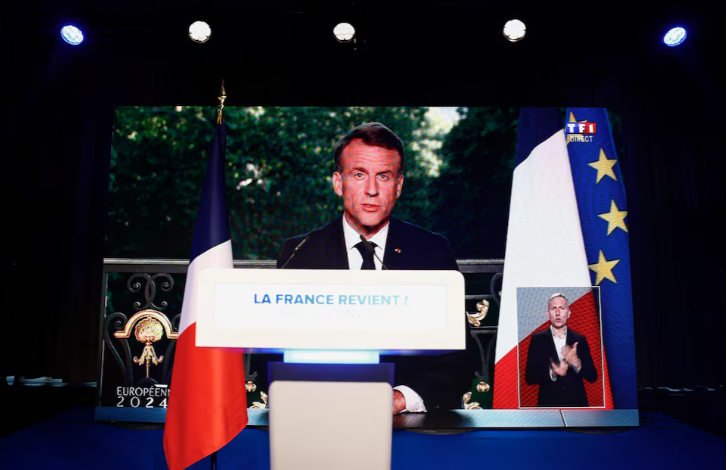Macron calls shock French elections after far-right rout

French President Emmanuel Macron rolled the dice on his political future on Sunday, calling snap legislative elections for later this month after he was trounced in the European Union vote by Marine Le Pen’s far-right party.
Macron’s shock decision set off a political earthquake in France, offering the far-right a shot at real political power after years on the sidelines and threatening to neuter his presidency three years before it ends.
If Le Pen’s National Rally (RN) party wins a parliamentary majority, Macron would be left with little sway over domestic affairs.
Macron said the EU result was grim for his government and one he could not ignore. In an address to the nation, less than two months before Paris hosts the Olympics, he said lower house elections would be called for June 30, with a second-round vote on July 7.
“This is an essential time for clarification,” Macron said. “I have heard your message, your concerns and I will not leave them unanswered … France needs a clear majority to act in serenity and harmony.”
After Macron’s announcement, a few hundred anti-far-right protesters gathered at Paris’ Place de la Republique, waving flags for green and leftist groups and chanting against the RN.
Led by telegenic 28-year-old Jordan Bardella, the RN won about 32% of the vote in Sunday’s vote, more than double the Macron ticket’s 15%, according to exit polls. The Socialists came within a whisker of Macron, with 14%.
Le Pen, widely seen as the frontrunner for the 2027 election in which Macron is unable to stand, welcomed his decision.
“We are ready to take over power if the French give us their trust in the upcoming national elections,” she said at a rally.
Macron’s Renaissance party currently has 169 lower house lawmakers, out of a total of 577. The RN has 88.
If the RN wins a majority, Macron would still direct defence and foreign policy but would lose the power to set the domestic agenda, from economic policy to security.
“Emmanuel Macron is a poker player, we’ve seen that tonight,” said Green Party lawmaker Sandrine Rousseau.
Uncomfortable ‘Cohabitation’
Teneo, a consultancy, said, “Macron has called an election he might lose.”
It said his ultimate “goal might be to bring an RN victory forward in time to expose the party’s lack of experience in government and make them confront politically painful decisions ahead of the 2027 presidential election.”
Olivier Blanchard, a former International Monetary Fund official who is now at the Massachusetts Institute of Technology, said Macron had made the best of a weak hand.
“Either the incoherence of the RN program becomes clear during the campaign and it loses the election. Or the RN wins, gets to govern and quickly makes a mess of it,” he wrote on X.
Macron’s gambit has echoes of Spanish Prime Minister Pedro Sanchez’s move to call a snap national election last year after the far right thrashed his party in local government polls.
Sanchez managed to retain power but only after months of wrangling with regional parties and a controversial deal to offer an amnesty to Catalan separatists.
France has known so-called “cohabitation” periods before when the president is from a different political party than the parliamentary majority. In such cases, the majority party’s prime minister becomes France’s top domestic decision-maker.
In the last such period, from 1997-2002, President Jacques Chirac played second fiddle to Socialist Prime Minister Lionel Jospin.
The euro slipped to its lowest level in around a month in early trading in Asia, reflecting the uncertainty.
Macron’s decision underlined what was a grim night for centrist parties across Europe, with Eurosceptic nationalists making the biggest gains in the European Parliament vote.
Successful battle heats up
Le Pen’s strong electoral showing, notching a 10-point increase on her 2019 EU result, is likely to lure conservative rebels to the RN, a party with a clear sense of momentum.
On Sunday night, Le Pen’s niece Marion Marechal, a political ally of Eric Zemmour and his far-right Reconquete party, said she was prepared to meet with her aunt to explore a pact.
“A right-wing coalition to me seems more necessary than ever,” Marechal said.
Le Pen’s ascent is also likely to turbocharge the centrist succession battle to replace Macron.
Several big names – including Interior Minister Gerald Darmanin, former Prime Minister Edouard Philippe, the current one, Gabriel Attal, and Finance Minister Bruno Le Maire – are all eager to take the top job, political sources say.
“We’ll have to do some soul-searching and explain to the French why we haven’t been able to listen to them enough,” Darmanin said in comments prior to Macon’s announcement.
Sunday’s results also saw the resurgence of the French centre-left, with Socialist candidate Raphael Glucksmann, a pro-Ukraine moderate, who won some 14%. His strong showing will embolden the Socialists, who had faced electoral oblivion after Macron’s 2017 election win.





